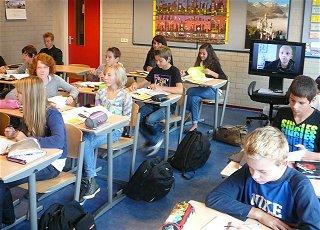It is easy to understand that a child with an illness or disability or both may have their education impacted. They might miss periods of schooling but they may also be distracted by pain, worry or medication, especially if the latter has to be administered at school. Often it is forgotten that siblings of these children can face challenges too in relation to their school experience which might result in emotional, social and academic impacts. Their connections with family and with their school might be compromised.
Their home life might be filled with stress, especially if the child with a disability or illness has difficult behaviour. They might be worried about the wellbeing of their brother or sister and what might happen, especially if they are in hospital. They might feel powerless to help. They might miss out on attention from parents, especially if trips away for treatment are necessary, and feel left out and alone. School connectedness is often cited as a crucial part of a child’s developing resilience. For siblings, this can be affected in a variety of ways. Some siblings find it difficult to have friends over to play or it may be difficult for parents to get them to outside activities at school such as sport or music. The family might miss some extra-curricular activities like parent-teacher interviews, learning journeys, BBQ nights, as it is all too hard. For some, growing up with a child with difficult behaviour might mean they have learnt some inappropriate ways to interact and this can make it difficult to make and keep friends. Some siblings have talked of being teased or bullied by other children because they have a brother or sister who looks or behaves differently. Of course, like the child with illness or disability, some siblings miss school completely due to a number of circumstances. They might need to go with the whole family if a child is having treatment in a different location (eg rural families often have to go to a city). And hospital schools don’t always cater for siblings so they have to change schools and, in some cases, they have to go back and forth between different schools. Siblings may also be called on to assume responsibilities beyond their years. For example, a sibling might need to stay at home to look after their brother or sister if parents need to work. But sometimes at school that responsibility can go too far, resulting in added stress for the child. One parent told how her child was called on by the school whenever there was an ‘issue’ related to the child with disability. In terms of academic results there can be impacts too. For some siblings there is a strong need to do well and so many go on to do very well at school but, for others, the stresses at home mean that they don’t get the support they need at home for their schoolwork, or they are distracted and unable to work at their best. In some cases, siblings have talked about leaving school early to help with the family. One sibling had an offer to study at a prestigious university away from her home but declined the offer so she could stay and support her family. There needs to be more research done on the impacts on siblings of a child with disability or illness – at home, school and the community. Siblings Australia has for many years been trying to raise awareness of the need to support siblings, not only for their own sake, but also in order to strengthen the relationship with the child with an illness or disability. Siblings can play a significant role in the wellbeing of a brother or sister with an illness or disability over a lifetime but they also need their own support along the way. Schools and parents can work together to ensure siblings are supported. Clearly, parents need to do considerable advocating for their child with illness or disability, but it is important to also help the school understand the pressures on the sibling. When education plans are developed annually for the child with illness or disability then a sibling could contribute much to the shared knowledge developed, but they also need to have their own needs assessed. Do they need help with social connections, or to complete homework? Do they need help to attend outside activities, sport or other school community functions? If a child has to move away for various lengths of time can there be ongoing connections with friends and teachers through their original school, via various technologies such as email, skype etc?
All schools should have a register of siblings in the same way they have a register of children with disability or illness. Siblings Australia has developed a number of resources including a peer support program, Sibworks, which has been used by several schools to support siblings, and a DVD for parents on how they can support their ‘other’ children. The organisation also runs workshops for parents and providers, including educators, on supporting siblings. Further information about the needs of siblings at school can be accessed via Siblings Australia. Kate Strohm is the Director of Siblings Australia. The second edition of her book, Siblings: Brothers and Sisters of children with a disability (Wakefield Press) will be released at the end of 2013. Thumbnail Image by adwriter.
